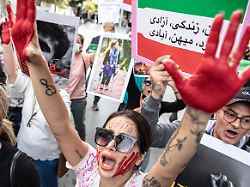Protests continue despite violence
Iran’s president wants to review laws
10/15/2022, 8:25 p.m
The security forces are brutally cracking down on the protests in Iran. But the people, especially women, are not deterred – they continue to take to the streets. The President of the country meanwhile wants to review the applicable law. However, it is unclear which laws he means.
Iran’s President Ebrahim Raisi sees a need to review some of the country’s laws. “When reviewing cultural structures, it is imperative to review, revise, update and, if necessary, revise the laws,” he said. The dialogue is also necessary in order to continuously evaluate certain topics and to eliminate “doubts” within society. “We should also see whether we have achieved the goals set and if not, where the problems lie,” he said, according to the IRNA news agency.
According to Raisi, there should also be more focus on the status and opportunities of women. Raisi did not say which laws he meant specifically and whether his demand relates to compulsory headscarves.
Observers are of the opinion that Raisi is now focusing on dialogue, as the violent and sometimes brutal operations of the police and security forces were unable to stop the protests. But don’t worry about the current “cyber war” against the system, says Raisi. “If the fundamentals of the system are solidly protected, then there’s no need to worry about that either.”
Because the protests are not only taking place on the street, but also digitally, the internet has been massively restricted and some websites have been blocked. According to the Iranian Chamber of Commerce, every hour of Internet blockage means a loss of over 1.5 million euros for the country’s numerous online entrepreneurs. According to the Norwegian-based human rights organization Iran Human Rights (IHR), at least 108 people have been killed during the protests, including 28 children.
“Mullahs should go away”
Meanwhile, despite the violent crackdown by security forces in Iran, scores of people protested against the country’s leadership for the fifth consecutive week. At a demonstration at Shariati University in the capital Tehran, women without headscarves shouted slogans such as “The mullahs should go away!”, according to a video distributed on the Internet. Other protests were reported from Isfahan and Kermanshah, among others. In the city of Hamedan, west of Tehran, projectiles were hurled at security forces from a whooping and whistling crowd, footage verified by the AFP news agency showed.
According to the online service 1500tasvir, young women at a university in Tehran shouted “freedom, freedom, freedom” while waving their headscarves in the air. The online channel, which documents protests and police attacks, also reported on striking shopkeepers in Kurdistan Province and western Azerbaijan.
According to the Norwegian-based human rights organization Hengaw, schoolgirls in the village of Ney in Mariwan province started their protests by “setting fires and chanting anti-government slogans”. As reported by online monitor NetBlocks, protesters were seen in videos shared on Twitter on the streets of the northwestern city of Ardabil. Footage distributed online also showed demonstrating students at universities in Tehran, Isfahan and Kermanshah.
Iran demands a “realistic approach” from the EU
In response to the protests, the Islamic Coordinating Council for Development called on the people of Iran to “express their revolutionary anger against rioters and rioters.” As a journalist from the newspaper “Schargh” reported, “pensioners” of the Revolutionary Guards were also asked to come together because of the “currently delicate situation”. According to the state-run Irna news agency, a commander at the meeting said three members of the Basij militia had been killed and 850 others injured since the protests began.
The people of Iran have the right to “peacefully protest and defend fundamental rights,” EU foreign policy chief Borrell wrote on Twitter after a phone conversation with Iranian Foreign Minister Hossein Amir-Abdollahian. According to an official statement in the phone call on Friday, he recommended that the Europeans “take a realistic approach to the issue”. Because of the violent crackdown on demonstrators in Iran, the EU countries agreed on new sanctions against Tehran on Wednesday. According to diplomatic circles, the EU foreign ministers are to officially decide on the punitive measures at a meeting in Luxembourg on Monday.
The protests in Iran were triggered by the death of the young Kurd Mahsa Amini. The 22-year-old died in Tehran on September 16 after being arrested there three days earlier by the vice squad on charges of not wearing her headscarf in accordance with regulations. Critics accuse the vice squad of using violence. The police firmly deny the allegations. Many Iranian women then protested by removing their headscarves or cutting their hair.
